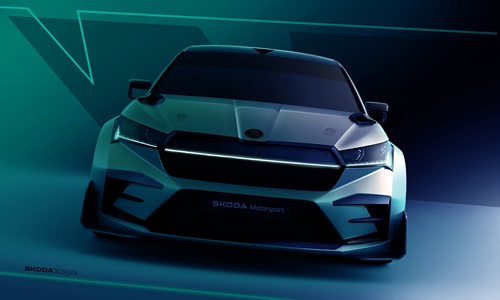With the new Enyaq RS Race concept study, Škoda Auto is exploring new sustainability possibilities in motorsports while further enhancing the brand’s emotional appeal. Raising Škoda’s motorsport DNA to the next level, the Enyaq RS Race features an aggressive design highlighted by a massive rear wing. This concept offers insights into how motorsport technology can help accelerate the shift towards a dynamic and sustainable automotive future. It also serves as an ideal platform for the development and rigorous testing of cutting-edge electric technologies for future battery-electric production vehicles.
The Enyaq RS Race is based on the Škoda Enyaq Coupé vRS. Equipped with all-wheel drive, the new Škoda Enyaq RS Race demonstrates the broad scope of possibilities the Volkswagen Group’s Modular electric drive matrix offers in terms of performance. With its aggressive design, the Enyaq RS Race is also a real eye-catcher, underlining its strong connection to racing and motorsport. Its broad base ensures even more stable handling, while the prominent rear wing provides the necessary downforce. The aim of the study is to gain practical knowledge through specific technical and design modifications of high-performance electric vehicles. These approaches could potentially be implemented in future production models.
The Enyaq RS Race represents another innovative battery-electric concept study from Škoda Motorsport, following the recently presented Škoda Vision GT. Introduced in 2021, the Škoda Fabia RE-X1 was built on the chassis of the Škoda Fabia Rally2 evo and equipped with an 860-volt electric motor delivering a peak output of 260 kW. The homologation by the Austrian Motorsport Association AMF (ÖAMTC) enabled the Baumschlager Rallye&Racing team to compete in the Austrian Rally Championship. With the Vision GT, Škoda recently took an entirely different approach: The spectacular, all-electric single-seater was exclusively designed for the Gran Turismo 7 PlayStation game. The concept study, inspired by the 1100 OHC Spider from 1957, expands Škoda’s presence in the digital racing world.
All these concept vehicles underscore Škoda’s commitment to advancing sustainability within motorsport. The Fabia Rally2 already runs on 100% sustainable fossil-free fuel in the WRC2, providing an ideal testbed for evaluating the technical viability, resilience, and durability of new electromobility innovations under extreme conditions.
